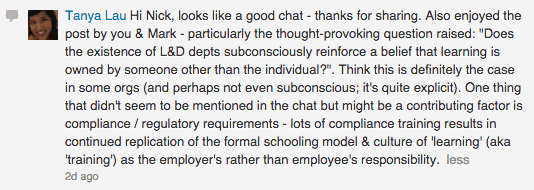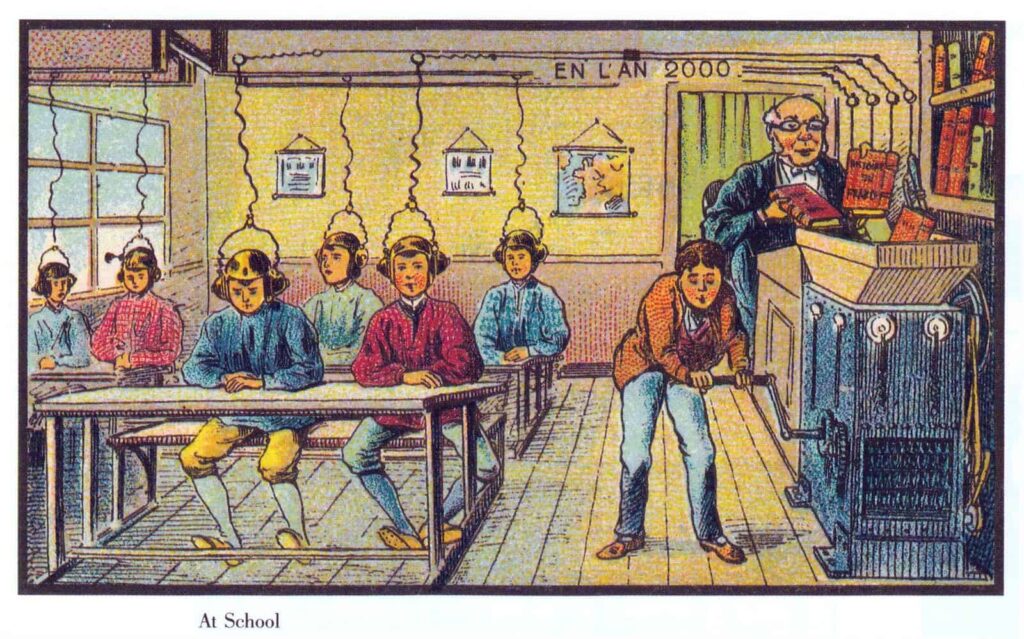I recently had my first experience on the other side of chat2lrn last Thursday with a co-authored guest post and questions with Mark Britz.
I’ll start off by saying it was an amazing experience. But then again what experience with Chat2lrn isn’t amazing?
I approached the chat2lrn crew with the topic Learned Helplessness of Learning. Mark Britz brought the topic to my attention in October and I’ve since written on it several times.
My first thoughts I wrote about in the blog post First Thoughts on Learned Helplessness. I then wrote about it in the post Social and Learned Helplessness in Learning. That led into bringing the topic to the chat2lrn crew and brining Mark into it so we could work together on bringing the chat to life.
If you noticed, you’ll see the name Learned Helplessness of Learning wasn’t the original name. Mark used the term Learned (Learning) Helplessness and I used the term Learned Helplessness in Learning.
We had a discussion on which made the most sense and arrived at Learned Helplessness of Learning. So, regardless of the term you see, as long as it has Learned Helplessness and Learning in it then it’s the same topic.
Questions
Shortly after Skyping with Mark and Lesley Price of the chat2lrn crew, Mark and I were busy at work authoring the questions in Google Docs.
I think the questions went through about 10 different drafts and weren’t finalized until the week before chat2lrn. The more iterations you go through, the higher quality the final product is what I always say.
The questions we started with during chat2lrn are as follows:
- What experience have you personally had with Learned Helplessness of Learning? #LHoL
- What examples of #LHoL have you seen displayed by others?
- How is Learned Helplessness of Learning similar and/or different from the concept of learned helplessness in general?
- Where does Learned Helplessness of Learning come from?
- What are the short-term and long-term effects of #LHoL in the workplace?
- What can organizations do to combat learned helplessness of learning in the workplace?
- What role can data play in helping people overcome #LHoL?
- How do we help people not return to old ways of thinking and “doing” learning? i.e. how do we encourage a new habit?
Even the final list of questions changed a bit once chat2lrn started, this is just a sign of how dynamic chat2lrn is.
Questions aren’t timed, they just go with the flow of the conversations people are having. The order of questions changed, some questions got dropped.
I was participating in the chat and found that I was even misreading some of the questions and answering them wrong! When you’re in a chat you get caught up in the discussion and sometimes it’s hard to keep things straight.
Chat Time
Chat time was hectic but fun as usual. There were many divergent discussions going on which is a sure sign it’s an interesting and broad topic. I’m glad others thought so also.
Chat2lrn is a dynamic discussion as I said before. The crew has a “backchannel” using Skype with discussions about the order of questions, if questions are dropped or rearranged.
This backchannel discussion makes for a dynamic chat because questions are fed to participants when it makes sense rather than pre-timed.
I was too busy at times to even see what was going on in the Skype chat so the chat2lrn crew had to take some liberties with the adjustments on the go, but it turned out great.
Tweet chats are a wonderful activity to take part in. They’re a whirlwind of discussion, ideas, and inspiration.
For a not so great multitasked (is anybody?) I wasn’t able to handle the backchannel very well. I did get a great deal out of the discussion though and will be reading over the curated Tweets many times.
Lots to Mull On
There were great discussions going on around the topic and I have several things to think about, and write about in upcoming posts.
I recommend catching up on the entire chat with curated Tweets from the chat.
Even after the chat I was receiving great information to think about in comments and elsewhere such as this one from Tanya Lau:

Learned Helplessness of Learning is such a broad topic which gives me a lot to think and write about. It is so close to how L&D operates in many organization too.
From the problems it presents to the different ways to solve it, there’s no one answer to it all. That was even more obvious after participating in chat2lrn.
Guest Post
After the questions where for the most part authored, I wrote a first draft of the post. It then made some great advances as Mark and I collaborated on it. Many of the sources we drew from came from Mark’s original post on the topic Learned (Learning) Helplessness.
If you haven’t read Mark’s post, do it now, and then reread it again. I have read it about 10 times and it still leads me to new thoughts and new information. It has spawned three posts by me, another one in the works, and a chat2lrn discussion and guest post.
Mark and I summed up how Learned Helplessness is defined and attempted to link it to the more focused topic of Learning. You can read the chat2lrn post Learned Helplessness of Learning on the chat2lrn blog.
Join the Discussion
If you haven’t ever been in a Tweet chat, it’s time to join in. They’re a great place to get new ideas, expand your world, and meet a lot of great people.
I hope the topic of Learned Helplessness of Learning has piqued your interest as it has mine. If you write about it I would love to read it. I hope the discussion and awareness of it continue to grow.
The best way to combat Learned Helplessness of Learning is to bring attention to it. Continuing the discussion is the first step to figuring out how we might empower people to take their future, their exploration, and their learning into their own hands.
Featured image attribution:
By Jean Marc Cote (if 1901) or Villemard (if 1910) http://publicdomainreview.org/2012/06/30/france-in-the-year-2000-1899-1910/ [Public domain or Public domain], via Wikimedia Commons

4 comments
tanyalau
Hi Nick, finally catching up on some blog posts I missed earlier! Thanks for the quote – and indeed for piquing my interest in the topic in the first place, and sparking additional tangential thoughts. I enjoyed the insights you provided here on the process of collaboratively constructing the post and questions for the chat, as well as how the chat2lrn was run. I can’t imagine having a whole ‘backchannel’ skype conversation whilst moderating and attempting to participate in a tweet chat all at once! That sounds intense – but sounds like a very collaborative process and a system that works to create a very dynamic 60 minute chat! I just wish that it wasn’t 1 or 2am in Sydney when chat2lrn is on…as I rarely if ever get a chance to participate in the live chat (I did once only when I stumbled upon it late at night when on holidays…)
Look forward to your upcoming posts on learned helplessness of learning!
Nick Leffler
It is quite an intense experience. I love hearing your input Tanya, and always appreciate your thorough and thought provoking comments.
I too wish chat2lrn was at a time when everybody could make it, but the globe is just too large 🙂 I do enjoy the new PKMchats though and am happy to be part of it with you, a time we can both make it 🙂
I know if I had a chat here that was at 1 or 2am I wouldn’t make it either, don’t blame you one bit. I never make lrnchat for a similar reason, it falls right during my main family time (5:30-6:30pm here) which I’m just not willing to give up 🙂
Ryan Tracey
Thanks for sharing this experience, Nick. These are insights not just into the topic of learned helplessness, but also of the pedagogy of twitter chats. Cheers!
Nick Leffler
Twitter chats are great. It’s almost the complete opposite of learned helplessness. Before you even know you want to learn about a topic you are introduced to something you never knew about and are researching it.
Kind of like reading different blogs, always a new perspective and always a new way to look at life. Just like there are over 7 billion learning styles, there’s about 7 billion ways of looking at things.
Thanks for the comment Ryan!
Comments are closed.